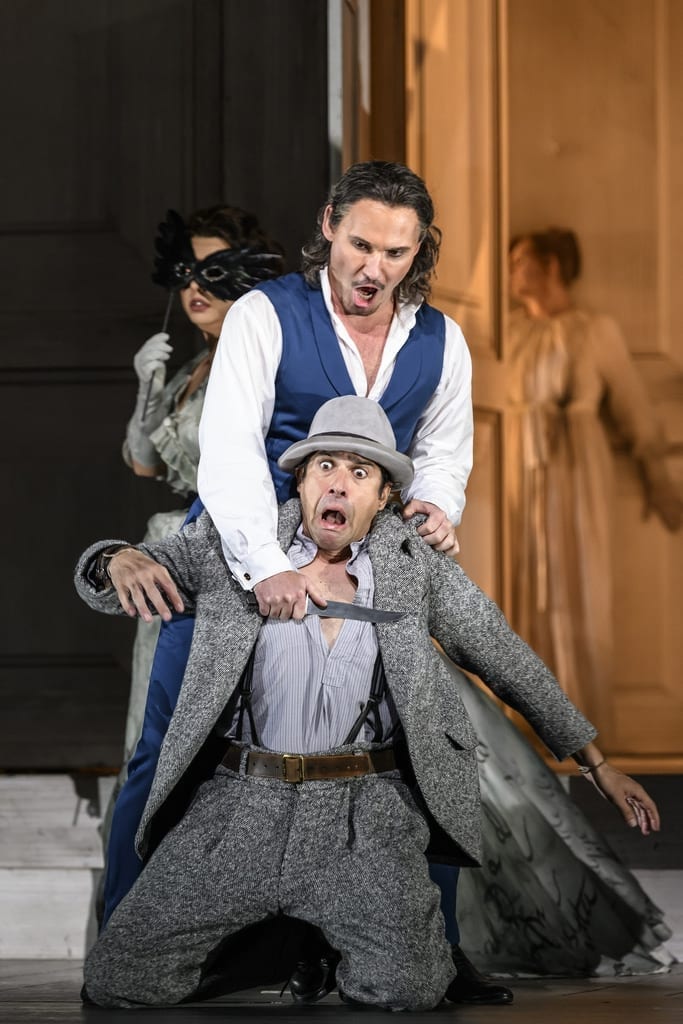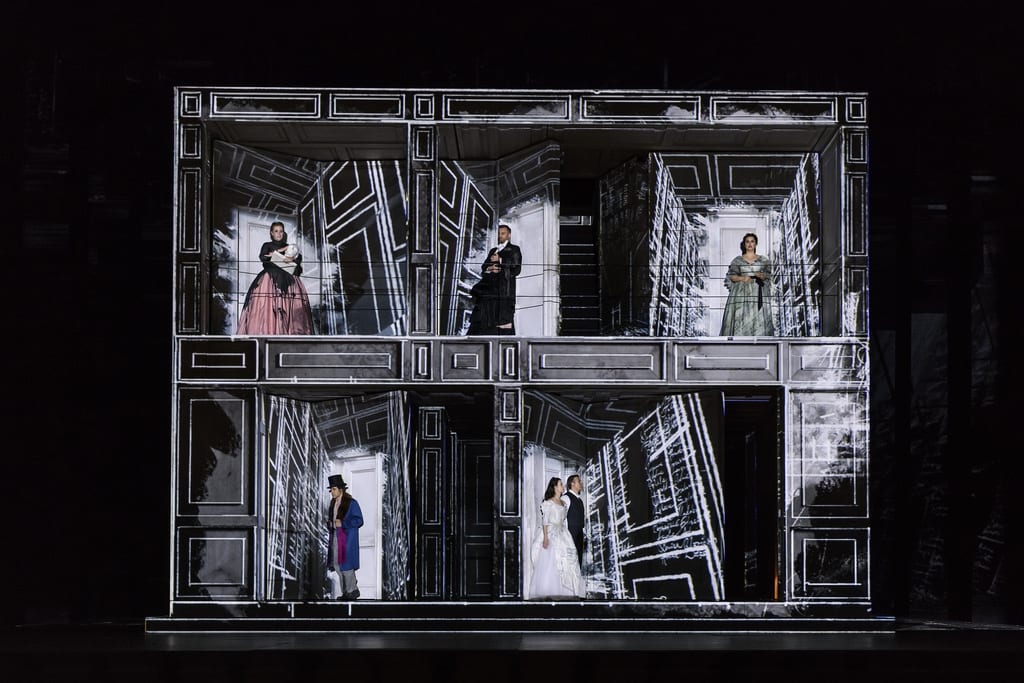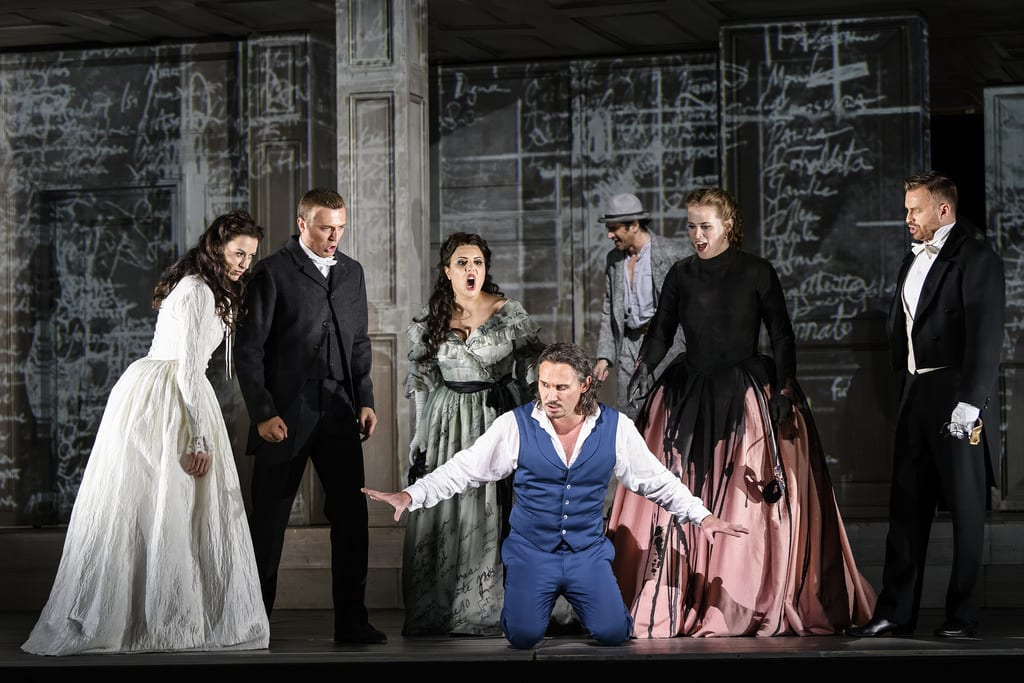Amy Lane’s revival of Kasper Holten’s 2014 production of Mozart’s Don Giovanni is a fast-moving, modern journey into the mind of the eponymous hero. The performance generates an exciting theatrical charge, though transgresses some dramatic elements in the libretto including the ending in a supernatural judgment.
Lorenzo da Ponte, Don Giovanni’s librettist, draws inspiration for the story from The Trickster of Seville and the Stone Guest, a 1630 play by a Roman Catholic Monk known as Tirso de Molina. The storyline of that play offers directors inexhaustible scope for interpretations.
Holten sets aside the moral maze. Don Giovanni is depicted as a bohemian aristocrat who has money and a voracious appetite for women. He charms and seduces them and, where necessary, he proposes marriage to them. He does not wear a physical mask to trick his way to a woman’s bed. They fall for his promises and charm. Even Donna Anna is a willing lover. Her sense of guilt for her father’s death is clear in her duet with her fiancé, Don Ottavio, in which she calls for retribution knowing, but not disclosing at this point, her father’s assailant. She does not look at the dead body but at her hands, as if to say ‘I have blood on my hands.’ Her speech demands revenge but her heart yearns for her lover. She does not reject Don Giovanni’s stolen kisses when her fiancé is not looking and, at one point, she willingly walks with Don Giovanni into what seems a private room.

The Polish baritone, Mariusz Kwiechien’s Giovanni vocally and dramatically fits the bill. Humour and swagger dominate his performance and his honeyed voice and words overcome the resistance of the women he desires. He first appears, without a mask and looking pleased with himself, when leaving Donna Anna’s bedchamber, that is, until he is confronted and challenged by the Commendatore (Willard White), Donna Anna’s father. A brief duel results in the father’s death. When Donna Anna and her meek fiancé Don Ottavio (Pavol Breslik) appear, Don Giovanni and his servant Leporello disappear.
Rachel Willis-Sørensen’s Donna Anna is superb – theatrically and vocally. Her character demands a dramatic coloratura soprano and she has the full, rich and strong voice to carry the part to a tee. Her duet with
Breslik’s Don Ottavio represents a perfect marriage of a meek and insecure fiancé and a nobleman passionately in love with his future wife. He offers Donna Anna a restrained physical passion, which helps to explain her appreciation and acceptance of Don Giovanni’s more fiery embrace.
The Armenian soprano Hrachuhi Bassenz’s Donna Elvira is forceful yet anguished, the wronged and jealous wife. Bassenz offers an engaging performance. Zerlina (Chen Reiss), a young peasant who is about to marry Masetto (Anatoli Sivko), is tempted by Don Giovanni’s offer of better life if she marries him, instead. Reiss’ performance is humorous with a touch of sarcasm. Ildebrando D’Arcangelo, the Italian bass-baritone, masterfully performs Leporello, Don Giovanni’s manservant and companion. He has the voice and stage presence befitting a Master.

The creative team generates a challenging ambience for the unfolding drama. The exquisite costume, designed by Anja Vang Kragh, places the action in the nineteenth century. The imaginative set—a slowly revolving cube that depicts the interior of staircases and rooms and exterior of a mansion—is a masterstroke. The set, designed by Es Devlin, supports the unfolding events in different locations, offering trios and quartets of singers a perfect platform to air their emotions in unison. The projections of video, designed by Luke Halls, expands and enrichs the effect of the dizzying lifestyle managed by Don Giovanni.
The ROH orchestra under the baton of Marc Minkowski delivers a fascinating performance of Mozart’s score.

